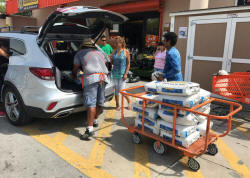|
Hurricane Irma could test
Florida's private flood insurance market
 Send a link to a friend
Send a link to a friend
 [September 06, 2017]
By Suzanne Barlyn [September 06, 2017]
By Suzanne Barlyn
(Reuters) - Hurricane Irma could test a
nascent private flood insurance market in Florida that some advocates
say is a model for making U.S. flood coverage more affordable and
commonplace in high-risk areas.
Florida’s private flood insurance market represents a tiny sliver of all
flood policies in the state, but if a hurricane does hit Florida later
this week, policyholders, industry and the federal government will see
how private insurance performs in one of the country's largest
flood-prone markets.
"It's a new breed of insurance in Florida," said Loretta Worters, a
spokeswoman for the Insurance Information Institute, an industry-funded
communications group. "You have these companies that have never been
tested for flood. We'll have to see how it works."
Even before Hurricane Harvey triggered massive flooding in Texas last
week, U.S. lawmakers were looking at alternatives to the indebted
government-backed model of flood insurance.

The National Flood Insurance Program (NFIP), which owes $24.6 billion to
the U.S. Treasury, is set to expire on September 30. It is the only
source of flood insurance for most Americans because the risk of
flooding is so high it makes it too costly for typical insurers to sell.
A Florida law in 2014 simplified the process for setting premium prices,
enabling private insurers to sell different types of flood policies in
the state, opening up the market.
Some advocates for reforming the program are pushing for additional
changes to U.S. regulations that they say will spur more Americans to
buy private coverage including making private flood policies suitable as
a condition for home loans.
Some flood reform advocates, however, argue against letting private
flood insurers into the market, because they say they will cherrypick
the most profitable risks and leave the NFIP to deal with the rest.
Florida has more than 1.7 million NFIP policies in force, representing
about 35 percent of all NFIP policies, according to the Florida Office
of Insurance Regulation and Federal Emergency Management Agency data.
But more than one million homes at risk for storm surge damage in six of
Florida's riskiest metropolitan areas are not covered by flood
insurance, according to an analysis of data from analytics firm
Corelogic by the FAIR Foundation, a Fort Lauderdale, Florida-based
non-profit group involved with flood policy issues.
[to top of second column] |

A Home Depot store employee helps to load bags of sand for customers
in the Little Havana neighborhood in Miami, Florida, September 5,
2017. Residents are preparing for the approach of Hurricane Irma.
REUTERS/Joe Skipper

That is because the homes are located in areas that the Federal Emergency
Management Agency (FEMA) has not designated as having the highest flood risk, a
designation that triggers the mortgage requirement to buy insurance, said Jay
Neal, FAIR Foundation president and chief executive officer.
"The only way to address that insured risk is to have the private market
participate," said Neal, who also heads the Florida Association for Insurance
Reform, a coalition of insurers and other business groups.
Insurers see opportunity in that untapped market. Nearly 30 insurers are
offering various types of private flood insurance coverage in Florida, including
units of American International Group Inc, Chubb Ltd. Progressive Corp and HCI
Group Inc, according to the regulator's website.
Insurers are buying reinsurance from companies such as Renaissance Re, Validus
Re and XL Catlin to hedge the risk.
More than 20,000 private market flood policies were in force in Florida as of
June 30, said Florida's insurance regulator.
Hurricane Harvey's punishing blows to Houston has spawned interest in private
flood insurance among Floridians, even before the chances of Hurricane Irma
hitting Florida increased, said Josh Butts, and insurance agent who owns
Cornerstone Insurance Inc in Tampa.

"We’ve sold more flood insurance during the last week because of what happened
in Texas than we have during a storm in Florida," Butts said.
(Reporting by Suzanne Barlyn; editing by Carmel Crimmins)
[© 2017 Thomson Reuters. All rights
reserved.] Copyright 2017 Reuters. All rights reserved. This material may not be published,
broadcast, rewritten or redistributed. |